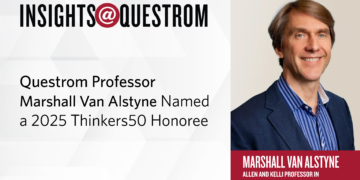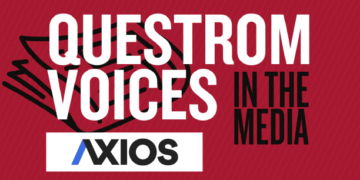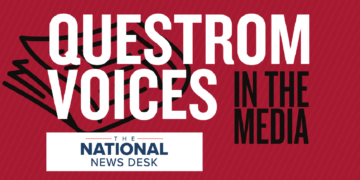The rise of the AI reporter
One of the most promising applications of Artificial Intelligence (AI) is that of generative AI: AI algorithms capable of producing textual, visual, and auditory content with little to no human intervention. For instance, the neural network called Generative Pre-trained Transformer 3 (GPT-3) is capable of producing textual content—a fictional story, a poem, or even a programming code—virtually indistinguishable from text written by a person[1]. This kind of generative AI might be more pervasive than you think. Even the news you read every day might have been written by neural networks; most likely, a good proportion of them is!
Major media companies such as the Washington Post, the New York Times, and Forbes have automated news production with the aid of generative AI – AI algorithms that autonomously produce textual content. With great advances in machine learning and natural language processing, the difference between content written by a human author and content produced by advanced neural networks, such as GPT-3, can be indiscernible even in domains quintessentially humanistic like poetry.
Reliance on generative AI to produce news is predicted to increase in the coming years due to their numerous benefits to publishers. AI systems may be faster and cheaper than human reporters—for example, the Wordsmith platform allowed the Associated Press to cover 4,400 companies opposed to the 300 allowed by human reporters. AI systems may also help publishers engage niche readers with hyper-local and personalized news at negligible marginal costs. It is then no surprise that AI algorithms such as the Washington Post’s Heliograph, Bloomberg’s Cyborg and Reuter’s Lynx Insight automatically report on financial markets, crimes, sports events, politics, and foreign affairs.
But how do people view AI-generated news?
Despite the increasing pervasiveness of AI and automation in news production, it is unclear how disclosing the use of AI algorithms will affect people’ perceptions of AI-generated news. As of today, the use of generative AI is typically not disclosed to the reader. AI may however lead to bias or misuse, and ethicists and policymakers advocate for transparently disclose its use. If disclosure requirements are enforced, future headlines might include a byline that tags AI as the reporter. How might this influence perception of how accurate the news is and trust in the reporter?
I explored this question in a paper titled News from Generative Artificial Intelligence Is Believed Less, published by FAccT ’22, the 2022 Association for Computing Machinery Conference on Fairness, Accountability, and Transparency, and in collaboration with our colleagues Andrey Fradkin, Luca Cian, and Gordon Pennycook. In two large pre-registered experiments on nationally representative US samples, we investigated the extent to which people perceive news generated by AI (versus by a human reporter) as accurate, and the degree to which people trust AI (versus human) reporters.
Two competing predictions are possible. One possibility is that because people will AI as lacking emotions, motives, and hidden agendas, they will view AI as more impartial than human reporters, perceiving AI-generated news as more accurate and trustworthy than human-generated news. The opposite prediction is also possible. There is more and more empirical evidence that people tend to resist automation and are generally averse to AI (for instance in healthcare, or when making hedonic purchases). People may also view the particular task of news reporting as requiring the experience of empathy and the making of moral judgments – experiences and judgments that AI is unable to deliver. People might therefore perceive AI-generated news as less accurate and trustworthy than news from human reporters.
Testing whether people believe in and trust AI-generated news
We tested these predictions in two experiments (datasets and experimental material are available here). We recruited a total of 4,034 participants so that they would be representative of the US in terms of age, gender, ethnicity and geographic region. We showed our participants several news items, each comprising a headline and accompanying photo. All news items had appeared on actual news outlets at the time of the experiments. To assess whether the news’s actual veracity made a difference, we used the fact-checking site Snopes.com and a-priori established whether a certain news item was completely true or completely false. Participants read that the news they would see might had been written by a human reporter or an AI reporter, this latter defined as “algorithmic processes that convert data into narrative new texts with limited to no human intervention beyond the initial programming choices.” To avoid potential doubts around accessibility to sources or data mining advantages, we informed participants that human and AI reporters had written the news based on information made available to them at the time they were written by the news outlet. In one experiment, participants saw either news tagged as written by a human reporter or news tagged as written by an AI reporter; in the other experiment, participants saw news written by both a humans and an AI reporter. The measure that was of key interest was perceived accuracy of the news – the extent to which people thought the news was accurate or not, trust in the reporter – the extent to which people trusted the reporter.
So what did we find? Both experiments indicated that when news headlines were tagged as written by an AI reporter, people believed the news headlines less than when news headlines were tagged as written by a human reporter. This effect manifested irrespective of whether the news was true or false: When news items were tagged as written by AI (compared to a human), people were more likely to incorrectly rate them as inaccurate when the news items were actually true, and more likely to correctly rate them as inaccurate when they were indeed false. Participants also trusted AI reporters less than human reporters. In a nutshell, disclosing the use of AI led people to believe news items less, a negative effect explained by lower trust toward AI than human reporters.
AI Faces Yet Another Hurdle
These results are yet more evidence that getting people to trust AI-based generative services is a significant hurdle these systems must overcome to gain traction. A deeper understanding of public perception of AI-generated text will be critical as the use of AI algorithms to generate content grows. Though there needs to be greater oversight with this growth as there is great potential for misuse and bias, it is equally important that policymakers understand that disclosure could be detrimental to organizations that are truthful and transparent. Furthermore, given current public distrust of media outlets, this call for transparency could backfire and provide yet another reason to distrust news sources.
Media outlets are faced with the challenges of not only grabbing the attention of readers in a highly competitive digital marketplace but also of earning their trust and readership. This is true of any organization that uses digital technologies to inform their customers, whether that be a regulator, business, or academic institution. In fact, the robustness of the negative effect of AI found in our experiments suggest that AI aversion applies to other domains where AI generated text is used. If forced to disclose AI-generated content, what can an organization do to retain trust in the information that it communicates? The answer is not yet clear, but our hope is that our findings raise awareness of the influence of disclosure of AI-generated content on perceived accuracy and trust and encourages greater research on this topic.
[1] See https://perma.cc/4VBZ-H5JC and copy.ai for a list of applications of the open-source GPT-3 to generate novels, essays, titles and headlines, podcast notes, resumes, recipes, computer codes, company statements, websites, advertisements, etc.

























